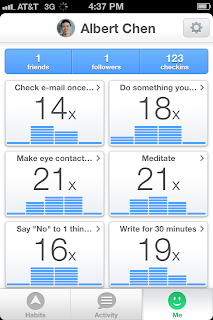The Goal
Every single day for the first 50 days of 2014, I forced myself to do something outside my comfort zone. And that's how I ended up having drinks with the vice president of a powerful company. ~The Outreach Habit: Everyday, I must make contact with one person that I otherwise would not have.~
~The Outreach Habit: Everyday, I must make contact with one person that I otherwise would not have.~Completion rate: 100%, tracked on Lift.
This usually entailed cold e-mails to people I don’t know. I wrote to the blogger Philip Guo telling him how much his article on grant writing helped me write my predoctoral fellowship, and he got back to me immediately and posted my message on his blog. I wrote to a graduate school dean proposing a collaboration- we start Monday. I got the new President of the University of Michigan to agree to speak to the MD/PhD program within 24 hours of the announcement of his selection by the Board of Regents. I also contacted dozens of alumni and other professionals to organize a series of career panels.
The Outreach Habit also included going up to a speaker after a talk. At a conference, this led to an e-mail exchange with a professor comparing data to assess the potential for a collaboration.
I suppose you could call this the Networking Habit, but I also want to get better at keeping in touch with old friends. Therefore, I wrote up a New Year's update blurb complete with photos and sent them to my friends. Many reciprocated. On really busy days, sending a quickly-modified blurb to another friend I hadn’t seen in years was a good, easy default.
___________________________________________________________________________
Difficult Skills = Worthwhile Skills
Why did I choose this habit?
Answer: because it’s hard. Really hard.
Or at least it's hard for me.
First, I just spent the last year maximizing my personal productivity, cultivating my ability to focus, and cutting out distractions. I wanted to focus on my science and my work. With that mindset, other people are distractions.
Second, when I started out, I had no idea how to make these meaningful, productive exchanges. The problem was that I was not used to putting myself in others’ shoes. If I was this person, why would I want to engage with this person who just sent me a random e-mail?
Solution? I tried to make these exchanges meaningful, not worrying about how incompetent I was. Once I made the decision to reach out to a particular person, I forced myself to come up with more and more reasons to make contact. I researched the person online if I didn’t know them. I thought about my own goals and what reasons they would have for wanting to help me out. I thought about each unique person and crafted an equally unique connection. With this information in hand, I could craft a meaningful (yet short) e-mail with a meaningful outcome.
But I didn’t give up just because I sucked. I wrote e-mails that were terrible and got no reply. I’m pretty sure I offended some people. I made some embarassing mistakes during public speaking events that resulted from this outreach habit. But that is part of the process. I only stuck with it because I knew that failure is actually just feedback to help me improve. This is the “get better” mindset- all that matters is that I improve. When I hit an obstacle, that’s life asking me, “are you sure you want to change?"
_____________________________________________________________________
Answer: because it’s hard. Really hard.
Or at least it's hard for me.
First, I just spent the last year maximizing my personal productivity, cultivating my ability to focus, and cutting out distractions. I wanted to focus on my science and my work. With that mindset, other people are distractions.
Second, when I started out, I had no idea how to make these meaningful, productive exchanges. The problem was that I was not used to putting myself in others’ shoes. If I was this person, why would I want to engage with this person who just sent me a random e-mail?
Solution? I tried to make these exchanges meaningful, not worrying about how incompetent I was. Once I made the decision to reach out to a particular person, I forced myself to come up with more and more reasons to make contact. I researched the person online if I didn’t know them. I thought about my own goals and what reasons they would have for wanting to help me out. I thought about each unique person and crafted an equally unique connection. With this information in hand, I could craft a meaningful (yet short) e-mail with a meaningful outcome.
But I didn’t give up just because I sucked. I wrote e-mails that were terrible and got no reply. I’m pretty sure I offended some people. I made some embarassing mistakes during public speaking events that resulted from this outreach habit. But that is part of the process. I only stuck with it because I knew that failure is actually just feedback to help me improve. This is the “get better” mindset- all that matters is that I improve. When I hit an obstacle, that’s life asking me, “are you sure you want to change?"
_____________________________________________________________________
Habits Change Who You Are
A week ago, I wanted to see if I truly made Outreach into a habit. So I ended this habit plan and archived the goal on Lift.
What happened? I began seeing outreach opportunities everywhere.
I heard that the vice president of a major company was coming to the university to give a talk on careers, and I immediately pulled up her e-mail address on LinkedIn and sent her a cold e-mail asking to meet for coffee. Within 1 hour of realizing she existed, I was on her schedule. We ended up having drinks for 3 hours and bonded over intellectual discussions and hilarious personal stories.
I now encounter very little inertia when e-mailing a random big-shot and ask for a coffee meeting. They almost always say yes. I’m meeting with a Principal at Boston Consulting Group this evening- I only e-mailed him yesterday.
Given that I used to suffer from social anxiety, it’s still a little hard to believe how comfortable I’ve become at making rapid and effective connections with complete strangers. How easy it is reach out to people who I’ve been feuding with or neglecting. And how fun it is.
It also opens up a whole new realm of possibilities. I can only reach a certain level of productivity working alone, no matter how much I improve personal skills like focus and time management. I can’t wait to see what I can make with others, working together.





















